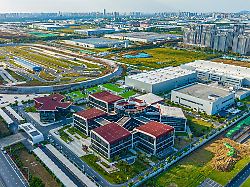“We learnt …”
VW decouples its China business from Germany
November 24, 2023, 11:16 a.m
Listen to article
This audio version was artificially generated. More info | Send feedback
VW has had enough of crises and political sanctions. The Wolfsburg-based company is now announcing that it wants to recapture the car market in China through faster and cheaper production. The responsible board of directors indicates complete independence from German production facilities.
In the future, Volkswagen wants to rely more on Chinese suppliers in the highly competitive car market in China and thus also protect itself from international crises. Political sanctions are a challenge for international manufacturers in China, and crises such as those in Ukraine or the Middle East are being observed that are affecting the economy, said Ralf Brandstätter, VW Group board member for China. According to him, the Wolfsburg-based company therefore wants to produce “in China, for China”. “We are striving for an autonomous, controllable value chain,” he explained. Volkswagen wants to rely on local suppliers in China so that it is no longer too dependent on imports or exports.
But it’s not just political imponderables. The Wolfsburg-based company, which is still strong in the combustion engine segment, has to make up ground on the electric car market in the world’s second-largest economy, because Chinese manufacturers have overtaken Volkswagen there: above all BYD, which sells significantly more electrically powered vehicles in China. Volkswagen therefore decided to expand the location in Hefei, a provincial capital almost 500 kilometers west of Shanghai characterized by countless residential towers.
Chinese buyers have different requirements
Within 2.5 years, the people of Wolfsburg built new production and development halls in the city with around eight million inhabitants where previously there was only a barren parking lot. “In a dynamic market environment, a high pace of development is crucial for competitiveness,” said Brandstätter. That means: E-car buyers in China have different requirements than in Germany, also because, according to VW, they are significantly younger at an average of 34 years old and their driving habits are different. In major Chinese cities, drivers spend a lot of time stuck in traffic jams. Entertainment is therefore more important than lots of horsepower.
But it won’t be that easy: Brandstätter, in his own words, expects “a very aggressive price level”. In addition to the large manufacturers, China’s electric car market is home to many small brands that are largely unknown in Germany. Xpeng is one of them. VW entered into a cooperation with the southern Chinese in order to secure new customers. Industry observers expect that smaller competitors in particular will not be able to withstand the price war and that many brands will disappear.
New independence for Wolfsburg
Brandstätter and his manager colleagues like to talk about “China Speed”. For VW this means: The group has to become faster in developing models and adapting to customer requirements. The Wolfsburg-based company wants to bring 30 new electric car models onto the market in China by 2030. A key to this is the Volkswagen China Technology Company (VCTC) in Hefei, which, in short, is shifting the development of models for the Chinese market from Wolfsburg to China, thereby shortening the time until vehicles and components are ready for the market by 30 percent should.
The group invested around one billion euros in this. By the end of 2024, around 3,000 people are expected to work there and develop models for the three joint ventures – the partnerships between VW and Chinese companies. Volkswagen China expects a significant cost reduction by focusing on Chinese suppliers.
Why are the people of Wolfsburg deciding to do this now?
“We learned that you can’t do this from 8,000 kilometers away, with only a six-hour time overlap,” said the responsible VW manager for research and development, Marcus Hafkemeyer, in Hefei. So far, every platform, so to speak the vehicle substructure, has been developed in Germany for China and then transferred. This is now to be done in Hefei in order to save costs and time for development. In addition, from Volkswagen’s perspective, Chinese suppliers have only become large in the last three to four years and have been able to deliver the quality that VW needs, it said.
